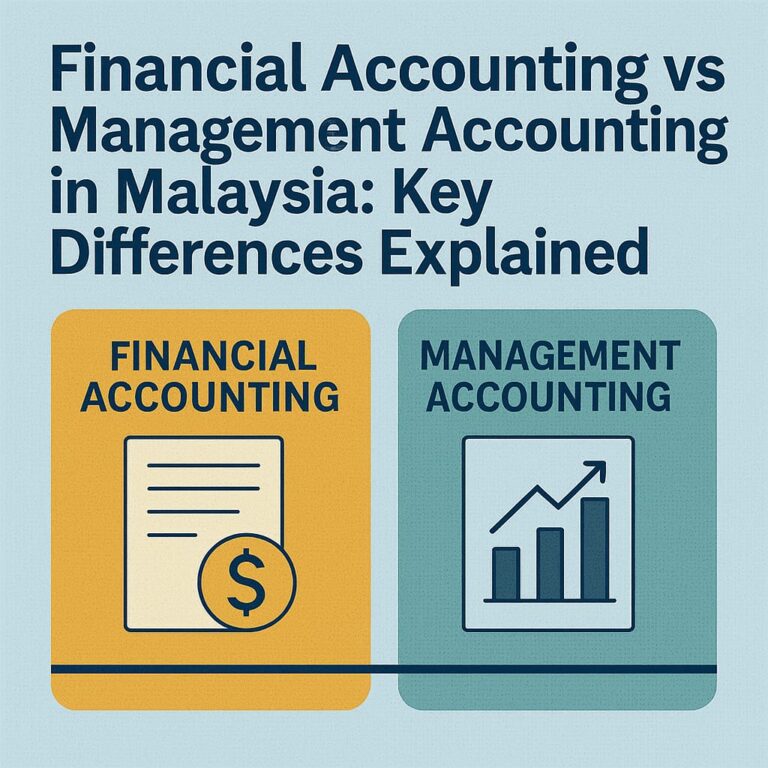Are You Curious To Know The Major Differences Between Financial Accounting And Management Accounting?
Aspirants of ACCA in Malaysia usually find themselves in a confusing situation where they cannot identify the differences between financial accounting and management accounting in Malaysia. If you are one of them, this blog will be a great guide to help you identify and assess key differences, advantages, and career pathways of financial accounting vs management accounting in Malaysia.
The qualification of ACCA in Malaysia focuses on various important areas of accounting and finance, including financial and management accounting. Both of these modules are an important part of the ACCA qualification as well as the accounting sector and play a vital role in building your career as an accountant in Malaysia. Financial accounting and Management accounting modules offer a comprehensive understanding of accounting techniques, principles, and formats. Both of them have a diverse accounting curriculum that mainly focuses on distinctive areas and is suitable for different accounting roles.
Financial Accounting vs Management Accounting in Malaysia:
Financial accounting and management accounting are both essential modules of ACCA in Malaysia, offering distinctive career pathways. Financial accounting is a primary source for communicating financial statements to external parties. This course includes the process of summarizing, recording, and reporting financial statements that showcase a company’s financial performance. Financial statements are of various kinds, such as balance sheets, cash flow statements, income statements, etc.
On the other hand, Management accounting is primarily used for decision-making purposes by managers or internal users. In this course, aspirants are well-trained to identify, analyze, measure, communicate, and interpret the financial performance or information of a company.
Purpose of Financial Accounting vs Management Accounting in Malaysia
Financial accounting is essential to communicate financial statements to external users such as stakeholders, investors, and tax authorities; these statements should be concise, transparent, and clear.
Management accounting is crucial for decision-making in a firm; it is used to provide managers with all the essential financial and non-financial information so that they can decide to improve the company’s overall performance.
Users of Financial Accounting vs Management Accounting in Malaysia:
Financial accounting is used by external users only; users are usually investors, stakeholders, regulators, tax authorities, etc. To be more specific, these users in Malaysia also include the Inland Revenue Board (IRB), the Companies Commission of Malaysia (SSM), Banks and investors, and Bursa Malaysia (for listed companies only).
On the other hand, Management accounting is used for internal decision-making by internal users such as managers, executives, etc. Management accounting allows them to plan, manage, and make informed strategic decisions for the betterment of the company.
Regulations and Standards:
In Malaysia, the financial statements must comply with certain local regulations and reporting standards such as Malaysian Financial Reporting Standards (MFRS), Private Entity Reporting Standards (PERS), and Malaysian Accounting Standards Board (MASB).
On the contrary, Management accounting in Malaysia is not regulated, which means there is no standardized law or regulation that needs to be followed. Companies can design financial reports and statements as per their need and preferences.
Reporting Frequency: Financial Accounting vs Management Accounting in Malaysia
Financial accounting reports and statements are usually prepared annually or quarterly in some cases (such as for the listed companies on Bursa Malaysia)
Whereas, Management accounting reports can be prepared monthly, weekly, or even on a daily basis; they are quite flexible, and the frequency of reporting is influenced by the business needs.
Reporting Format For Financial Accounting vs Management Accounting in Malaysia:
Financial accounting follows standardized reporting formats, for example: Income statements, statements of cash flows, statement of financial position, balance sheets, etc.
On the other hand, Management accounting has no standard reporting format; rather, it uses custom formats that are tailored according to business needs. For example: variance analysis, budgeting reports, departmental performance reports, etc.
Time Orientation of Financial Accounting vs Management Accounting in Malaysia:
Financial accounting emphasizes historical recording and reporting, which means it places more focus on past financial results.
Management accounting follows a future-oriented approach; it focuses on the upcoming financial performance of a company by planning, forecasting, and budgeting.
Audit Requirements of Financial Accounting vs Management Accounting in Malaysia:
The audit requirements of Financial Accounting are predetermined; audit is mandatory under the Companies Act of 2016 (Malaysia).
Whereas, in management accounting, the reports are not subject to audit because these reports are for internal use only.
Key Considerations of Financial Accounting vs Management Accounting in Malaysia: An Overview
Some of the major differences between financial accounting and management accounting are given below:
- The purpose of financial accounting is to communicate financial position to outsiders; in management accounting, the main purpose is decision-making.
- Primary users of financial accounting are external parties that make financial decisions, while management accounting users are internal managers who plan and control organizational and financial activities.
- Financial accounting focuses on the past and is history-oriented, whereas management accounting is future-oriented.
- Financial accounting deals with objective financial information; management accounting deals with financial and non-financial information.
- Time of financial accounting can range from monthly to quarterly reports, whereas management accounting can be ultra-current to a very long time horizon.
- Financial accounting is formal, while management accounting can be both formal and informal.
Conclusion:
If you are an aspirant of ACCA in Malaysia trying to get in-depth knowledge about financial accounting and Management accounting to know how they can affect your professional life ahead, know that both of these courses offer comprehensive accounting knowledge. This knowledge is highly valued in the accountant’s profession; therefore, stay focused and give your best in these courses to showcase extraordinary academic performance.
Frequently Asked Questions (FAQs)
Q1: Is it mandatory to audit financial statements in Malaysia?
Ans: Yes, according to the Companies Act 2016, most of the company’s financial statements are required to be audited every year.
Q2: Enlist the types of reports usually used in management accounting.
Ans: The types of reports usually used in management accounting are as follows:
- Performance evaluations,
- Cost analyses,
- Variance reports,
- Budget reports, etc.





